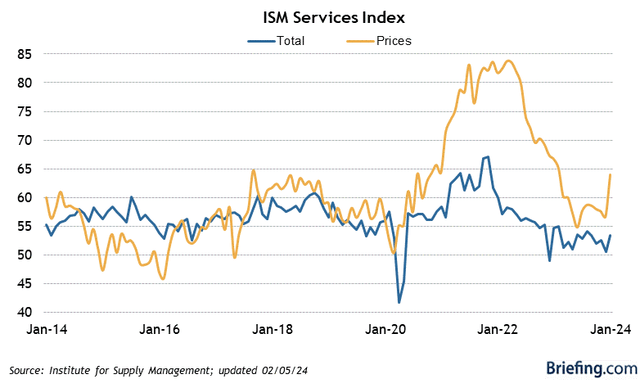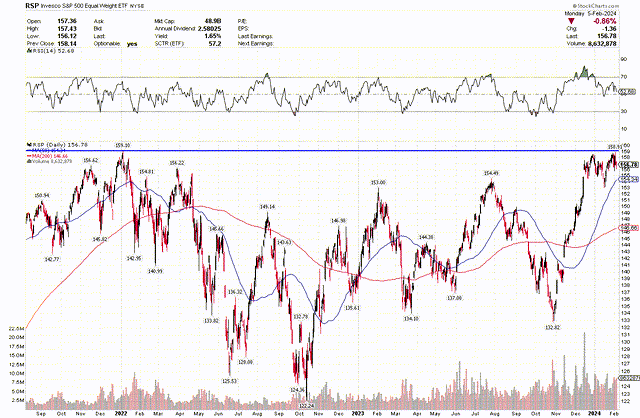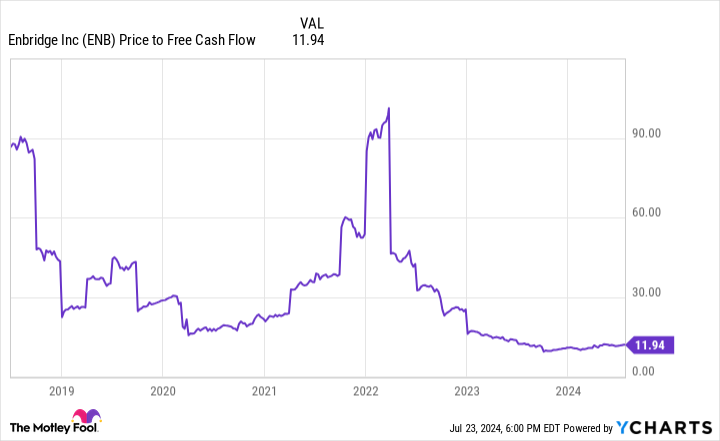Summary
- The market is experiencing a pullback due to uncertainty surrounding rate cuts and inflation concerns.
- The Institute for Supply Management reported a rise in its Services Index, indicating moderate economic growth.
- S&P Global’s service sector survey shows softened inflationary pressures, suggesting prices are rising at a slower rate.
- This idea was discussed in more depth with members of my private investing community, The Portfolio Architect. Learn More »
primeimages
I have been looking for a pullback in the major market averages since the beginning of this year that would consolidate the gains from November and December of last year without undermining the uptrend. If it were not for the magnificent ones, it would be a lot easier to see that this is in fact happening. To no one’s surprise, the excuse to sell has been pushback from Chairman Powell and other Fed officials on the market’s expectation for an initial rate cut in March. They assert that the rate of economic growth is strong enough for them to hold off, while there is still a risk that inflation may rebound. I think they are selectively picking out economic data to support that view, because there is far more data that refutes it. Either way, the uncertainty is fueling a pullback in risk asset prices that we desperately need.
Yesterday, the Institute for Supply Management reported that its Services Index rose from 50.5% in December to 53.4% in January, which was a four-month high. That indicates that the economy is growing at a faster pace than in December, but it is hardly robust coming off the line of demarcation (50%) between expansion and contraction. The rebound feels stronger than it should because it follows what appeared to be an extremely strong January jobs report on Friday. Adding fuel to the fire, the sub-index for prices paid by service companies jumped a whopping 7.3% from 56.7% to 64%., which suggests a rebound in economic strength is driving prices higher again. No wonder investors fear higher for longer short-term interest rates.
Yet higher prices in the ISM report are likely due to elevated shipping costs caused by the conflict in the Red Sea, which should be a temporary phenomenon. Furthermore, the price increases in the ISM report were not confirmed by the service sector survey conducted by S&P Global. To the contrary, their Services Index for January showed that inflationary pressures softened with companies raising “output charges at the slowest pace in the current sequence of increase that began in June 2020.” In other words, prices have been rising at the lowest rate since the beginning of the pandemic.
S&P Global’s Chief Economist, Chris Williamson, noted that “price pressures have meanwhile shifted lower. Overall service sector input cost growth is now running at the second lowest for over three years, helping pull selling price growth across goods and services down to a level consistent with inflation dropping materially below the Federal Reserve’s 2% target in the near future.”
S&P Global surveys approximately 400 companies in the service sector for their index, while the Institute for Supply Management no longer provides that data. The last time it did was in 2022 and there were 300 participants. They are obviously surveying different companies with different service sector industry exposure. Obviously, the ISM survey is more sensitive to the increase in transportation costs, but this is hardly a meaningful disruption in the disinflationary trend that should have us at the Fed’s 2% target during the second half of this year. I continue to believe the Fed should begin its rate-cut cycle in March.
As for the ongoing pullback, it is most evident in the equal-weight S&P 500 index, which has yet to exceed its January 2022 all-time high. The average stock has been treading water for the past six weeks just beneath that level. This period of consolidation is occurring more through time than price, which is just fine by me.
I expect this to continue until the consensus gains more conviction that rate cuts are coming sooner than later, which should be supported by additional signs of disinflation and slower rates of economic growth.
Lots of services offer investment ideas, but few offer a comprehensive top-down investment strategy that helps you tactically shift your asset allocation between offense and defense. That is how The Portfolio Architect compliments other services that focus on the bottom-ups security analysis of REITs, CEFs, ETFs, dividend-paying stocks and other securities.
This article was written by
Lawrence Fuller has been managing portfolios for individual investors for 30 years, starting his career at Merrill Lynch in 1993 and working in the same capacity with several other Wall Street firms before realizing his long-term goal of complete independence when he founded Fuller Asset Management.
He is the leader of the investing group The Portfolio Architect, which focuses on an overall economic and market outlook that complements an all-weather investment strategy designed to produce consistent risk-adjusted market returns. Features include: Portfolio construction guidance, access to an “All-Weather” model portfolio and a dividend and options income portfolio, a daily brief summarizing current events, a week ahead newsletter, technical and fundamental reports, trade alerts, and 24/7 chat. Learn More.
Analyst’s Disclosure: I/we have no stock, option or similar derivative position in any of the companies mentioned, and no plans to initiate any such positions within the next 72 hours. I wrote this article myself, and it expresses my own opinions. I am not receiving compensation for it (other than from Seeking Alpha). I have no business relationship with any company whose stock is mentioned in this article.
Lawrence Fuller is the Principal of Fuller Asset Management (FAM), a state registered investment adviser. Information presented is for educational purposes only intended for a broad audience. The information does not intend to make an offer or solicitation for the sale of purchase of any specific securities, investments, or investment strategies. Investments involve risk and are not guaranteed. FAM has reasonable belief that this marketing does not include any false or material misleading statements or omissions of facts regarding services, investment, or client experience. FAM has reasonable belief that the content as a whole will not cause an untrue or misleading implication regarding the adviser’s services, investments, or client experiences. Past performance of specific investment advice should not be relied upon without knowledge of certain circumstances or market events, nature and timing of investments and relevant constraints of the investment. FAM has presented information in a fair and balanced manner. FAM is not giving tax, legal, or accounting advice. Mr. Fuller may discuss and display charts, graphs, formulas, and stock picks which are not intended to be used by themselves to determine which securities to buy or sell, or when to buy or sell them. Such charts and graphs offer limited information and should not be used on their own to make investment decisions. Consultation with a licensed financial professional is strongly suggested. The opinions expressed herein are those of the firm and are subject to change without notice. The opinions referenced are as of the date of publication and are subject to change due to changes in market or economic conditions and may not necessarily come to pass.
Seeking Alpha’s Disclosure: Past performance is no guarantee of future results. No recommendation or advice is being given as to whether any investment is suitable for a particular investor. Any views or opinions expressed above may not reflect those of Seeking Alpha as a whole. Seeking Alpha is not a licensed securities dealer, broker or US investment adviser or investment bank. Our analysts are third party authors that include both professional investors and individual investors who may not be licensed or certified by any institute or regulatory body.


















Disagree with this article?
Submit your own.
To report a factual error in this article, .
Your feedback matters to us!